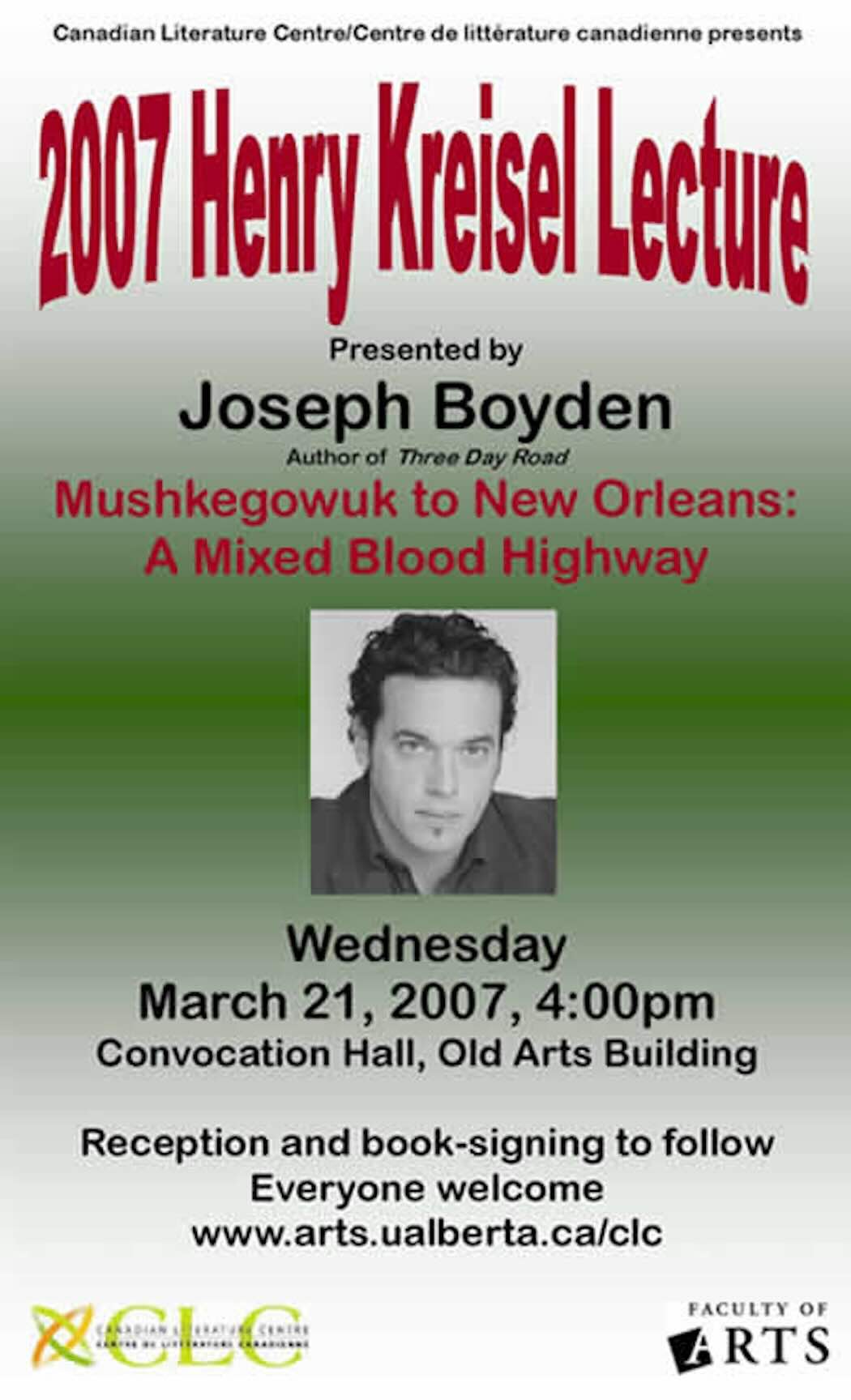2016 Kreisel Lecture with Margaret Atwood
"The Burgess Shale: The Canadian Writing Landscape of the 1960s"
To celebrate a decade of its flagship public event, the Canadian Literature Centre invited Margaret Atwood to give the 10th annual Kreisel Lecture. The lecture, titled "The Burgess Shale: The Canadian Writing Landscape of the 1960s," was accompanied by a presentation of images and followed by a Q & A, reception, and book signing. The event took place at Edmonton's Winspear Centre on Thursday, April 7, 2016.
Watch the lecture (and see the PowerPoint) on YouTube.
Listen to "What did we think we were doing?," an episode of CBC Radio One's IDEAS that originally aired on September 16, 2016.
Description of the episode from CBC:
"What did we think we were doing, we young writers of Canada?"
That's a question Margaret Atwood asked during a Canadian Literature Centre talk in Edmonton. In excerpts from the talk and in conversation with Paul Kennedy, she considers the accidental but sometimes intentional creation of a culture and a tradition.
In both lecture and interview, Ms. Atwood entertainingly recounts some of the events, large and small, that helped shape her writing and Canadian literature. Some things were unimaginable decades ago, like the diversity and strength of Canadian writing today . . . or the technology she uses to help tell the tale. "Just think," she says, "a person of my age knows how to do a PowerPoint!"
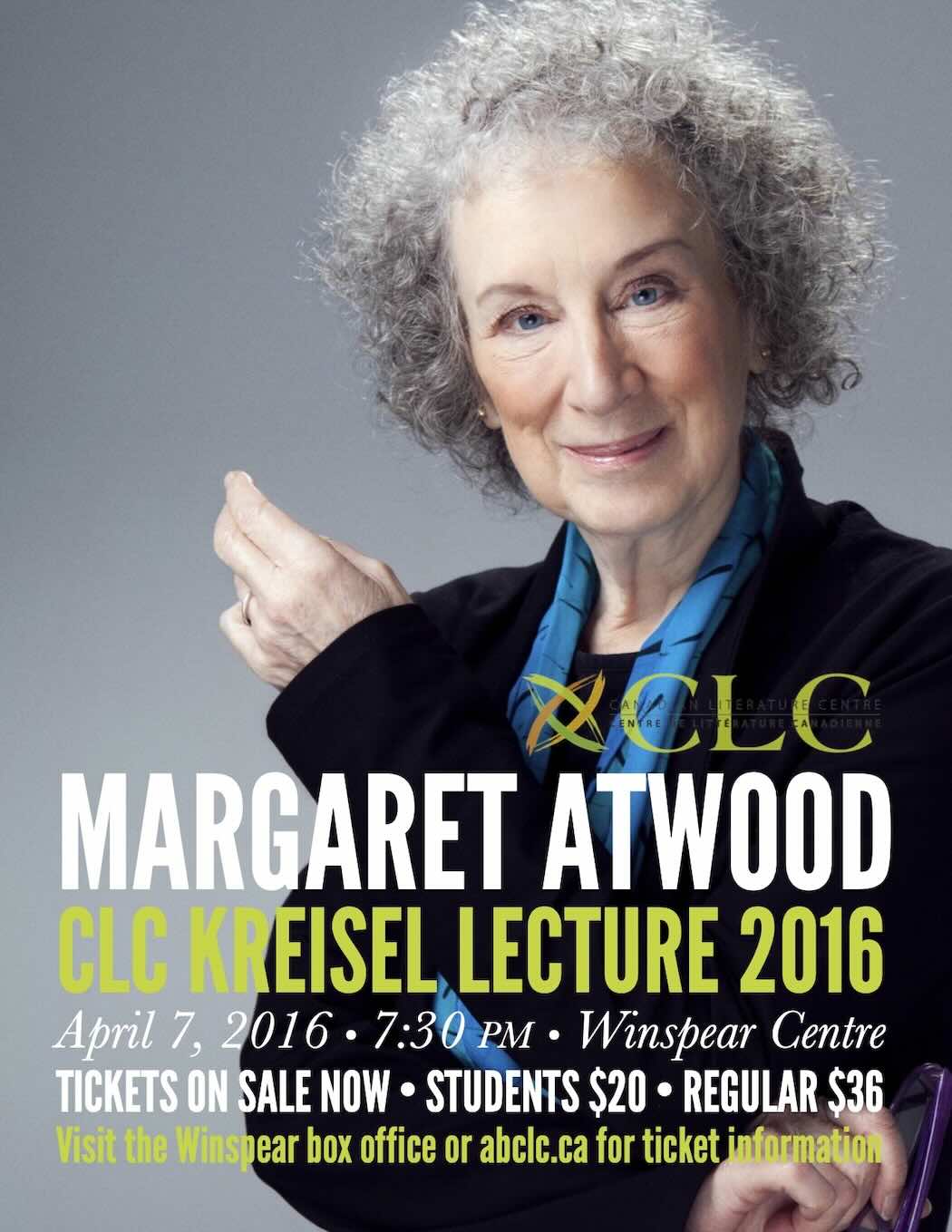
Portrait photo credit: Jean Malek
Lecture Abstract:
The Burgess Shale is a geological formation discovered in the Canadian Rocky Mountains that contains the fossils of many weird and strange early life forms, different from, but not unrelated to later and existing forms. I have name my re-visitation of the Canadian writing landscape of the 1960s after it, perhaps whimsically: that period is already fossilized, in a manner of speaking, and it does contain many weird and strange life forms, different from but not unrelated to forms we see today.
How did Canadian writers then see themselves and what they were doing? Did they think of themselves as having "careers," or rather "vocations"? What did they mean by "writer"? What were the elements in their environment that allowed them to flourish, or not? What magazines, physical venues, publishers, bookstores, and attitudes? What then changed, in the 1970s, the 1980s, and beyond? The generation of the 60s was indeed instrumental in creating the writer-related institutions we see around us today, from unions and private grant programmes and prizes to book tours and book festivals; they did it, not for fun, but out of perceived need.
Today's Canadian writing landscape would be unrecognizable to those writing in the 60s, or mostly unrecognizable. But just as an arthropod is still an arthropod, despite the time that's passed since the Burgess Shales, writing is still writing, and writers are still writers, whatever we mean by that. The prickly bits remain.
This lecture was published with the title The Burgess Shale: The Canadian Writing Landscape of the 1960s.
Author biography that was included in the event press release:
Novelist, story writer, poet and essayist Margaret Atwood is a contemporary icon. Her large body of work has garnered international critical acclaim and numerous literary awards, including the Booker Prize, the Giller Prize, the Arthur C. Clarke Award, and the Governor General’s Award. Atwood is perhaps best known for her novels, which include The Edible Woman, The Handmaid’s Tale, The Robber Bride, Alias Grace, The Blind Assassin, and the MaddAddam trilogy, which is currently being adapted as an HBO TV series. Her new novel, The Heart Goes Last, was published in September, 2015, by Penguin Random House. Atwood’s critical acclaim is matched by her popularity with readers: her books are regular bestsellers, and she boasts over 1.12 million followers on Twitter. Her wit and her prowess in social commentary are evident in her work; “The answers you get from literature,” Atwood has said, “depend on the questions you pose.” Wickedly profound, she challenges audiences to reflect on our relationship to language and literature, and how they affect our lives. Forthcoming in Fall 2016 are Hag-Seed, a revisitation of Shakespeare’s play The Tempest, and the graphic novel series Angel Catbird, from DarkHorse Comics.
2015 Kreisel Lecture with Lynn Coady
"Who Needs Books?"
On Monday, April 13, 2015, Lynn Coady presented the 9th annual Kreisel Lecture, titled "Who Needs Books?" Paul Kennedy, host of CBC Radio One's IDEAS, introduced Coady, whose lecture was recorded by CBC. The lecture was followed by a reception and book signing at the TIMMS CENTRE for the ARTS.
Listen to "The Monster At The End," an episode of IDEAS that originally aired on May 6, 2015. This episode brings together excerpts from the Kreisel Lecture and from a conversation between IDEAS host Paul Kennedy and Lynn Coady that took place a few days later.
Lecture Abstract:
What is the anxiety about 'the end of books in the digital age' really about? It seems to me that if we are going to talk about the death of “the novel” (a topic on which prominent fiction writers like Jonathan Franzen and Will Self have recently prognosticated), we have to take care that what we’re not actually talking about is the death of an economic model. Or, if we decide that is what we are talking about, that the two are somehow indivisible, we need to acknowledge that this might be taken as a dubious proposition to some. We need to make an argument for that first, before we can carry on bemoaning the novel’s demise.
And making that argument leads us to a much more interesting set of questions: What is a novel? Must a novel be a book? What, then, is a book? Not the physical object, but the aesthetic experience of a given reader? What is the difference between the two? The crux of the question being: what is the experience we’re having when we read a novel, and does that experience absolutely require the mechanics of what we currently think of as a book: pages, printed text, a spine and a front and back cover? What happens when we separate our idea of “the book” from the experience books have traditionally provided?
And does this thing that happens destroy our experience of reading fiction altogether, or alter it beyond recognition? If the answer is yes, the end of books is indeed a terrifying prospect to readers and writers alike. But if the answer is no, what exactly is it we're so worried about?
This lecture was published with the title Who Needs Books? Reading in the Digital Age.
Author biography that was included in the event program:
Lynn Coady is an award-winning author and journalist whose work has consistently drawn critical and public attention. Her first novel, Strange Heaven, was a Governor General’s Award nominee. Her subsequent books, Play the Monster Blind, Saints of Big Harbour, and Mean Boy were each recognized by the Globe and Mail as a “Best Book” in 2000, 2002, and 2006 respectively. In 2011, her novel The Antagonist was shortlisted for the prestigious Scotiabank Giller Prize, an award she won in 2013 for her short story collection Hellgoing. Her journalism has been published in such publications as Saturday Night and Chatelaine, and Coady is also a founding editor of the Edmonton-based magazine Eighteen Bridges.
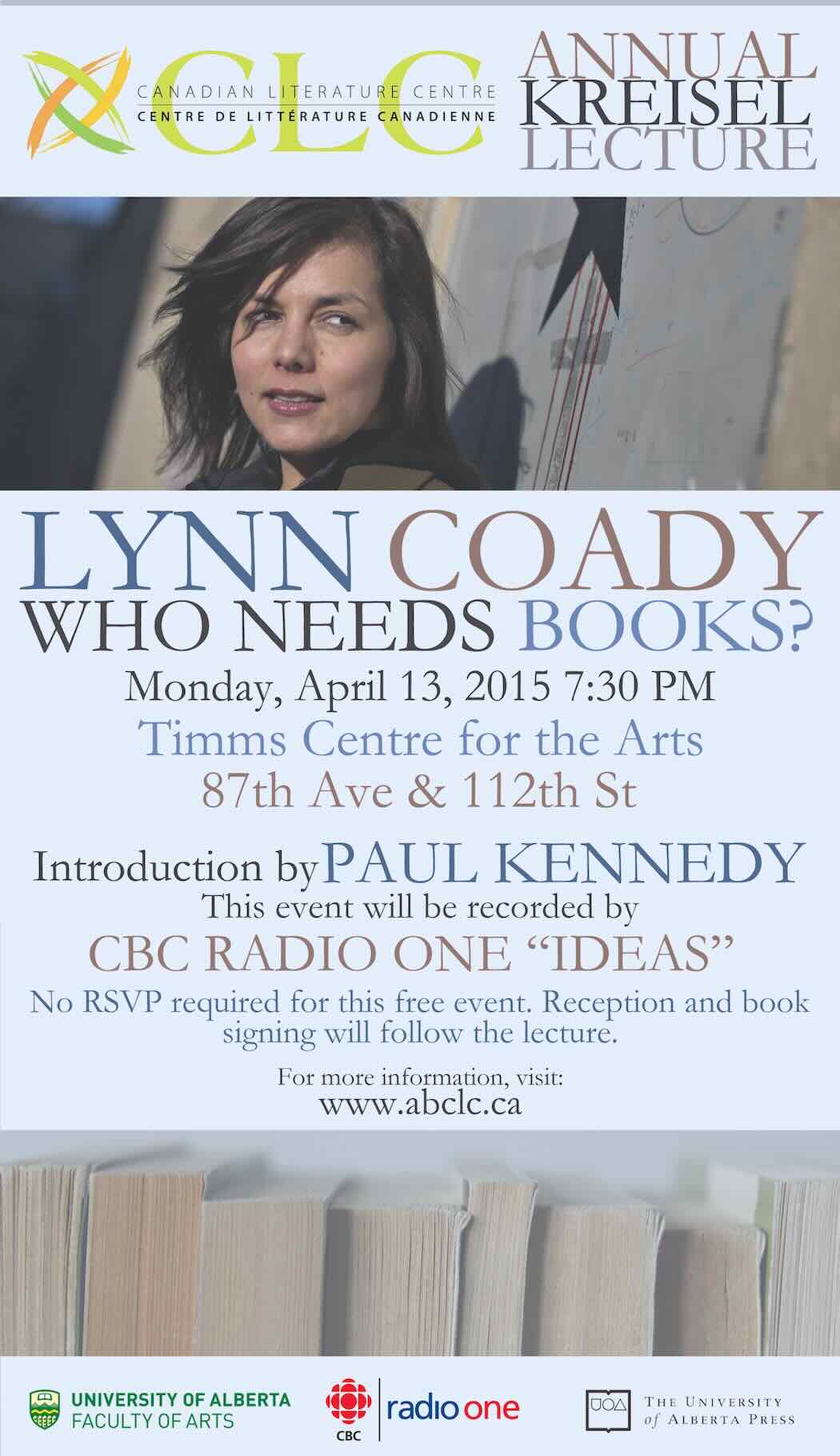
2014 Kreisel Lecture with Tomson Highway
"Understanding Each Other: The Essential Importance of Multilingualism Through the Prism of Cree, French, and English"
On Thursday, March 6, 2014, Tomson Highway presented the 8th annual Kreisel Lecture, titled "Understanding Each Other: The Essential Importance of Multilingualism Through the Prism of Cree, French, and English." Christine Sokaymoh Frederick, Artistic Director of Alberta Aboriginal Arts, introduced Highway, who intertwined Cree, French, English, Dene, and music in this lecture. The lecture was followed by a reception and book signing at the TIMMS CENTRE for the ARTS.
Watch the complete lecture, or watch a series of excerpted clips, on YouTube.
Lecture Abstract:
I had the immense privilege of growing up in two languages, neither of them French or English. They were Cree, my mother tonge, and Dene, the language of the neighboring Nation, a people with whom we fished and hunted both north and south of the border between Manitoba and what is now called Nunavut. English came later; at age 62, I'm still mastering it. And then came French. And I've since gone on to other languages. Multilingualism, the greatest gift you can give your child. In doing so, you give him the world. In my case, it gave me a thriving international career that takes me regularly to all four corners of the globe. It has taken me to a place in my life where the entire planet is my home. So I figure, if I can do it, then anyone can . . . .
This lecture was published with the title A Tale of Monstrous Extravagance: Imagining Multiculturalism.
Author biography that was included in the event program:
Tomson Highway enjoys an international career as a playwright, novelist, pianist and songwriter. He is considered one of this country’s foremost Indigenous voices. He is best known for his award-winning plays, The Rez Sisters (1986), Dry Lips Oughta Move to Kapuskasing (1989), Rose (2000), and Ernestine Shuswap Gets Her Trout (2005), as well as his critically-acclaimed novel Kiss of the Fur Queen (1998). His most recent play is a one-woman musical called “The (Post) Mistress.” Highway has won four Dora Mavor Moore Awards, a Chalmers Award, and a Wang Festival Award. In 1994, he was named a Member of the Order of Canada, the first Indigenous writer to be inducted. He holds ten honourary doctorates and has been writer-in-residence at universities across Canada. He has travelled extensively around the globe as a speaker and performer, having visited 55 countries to date.
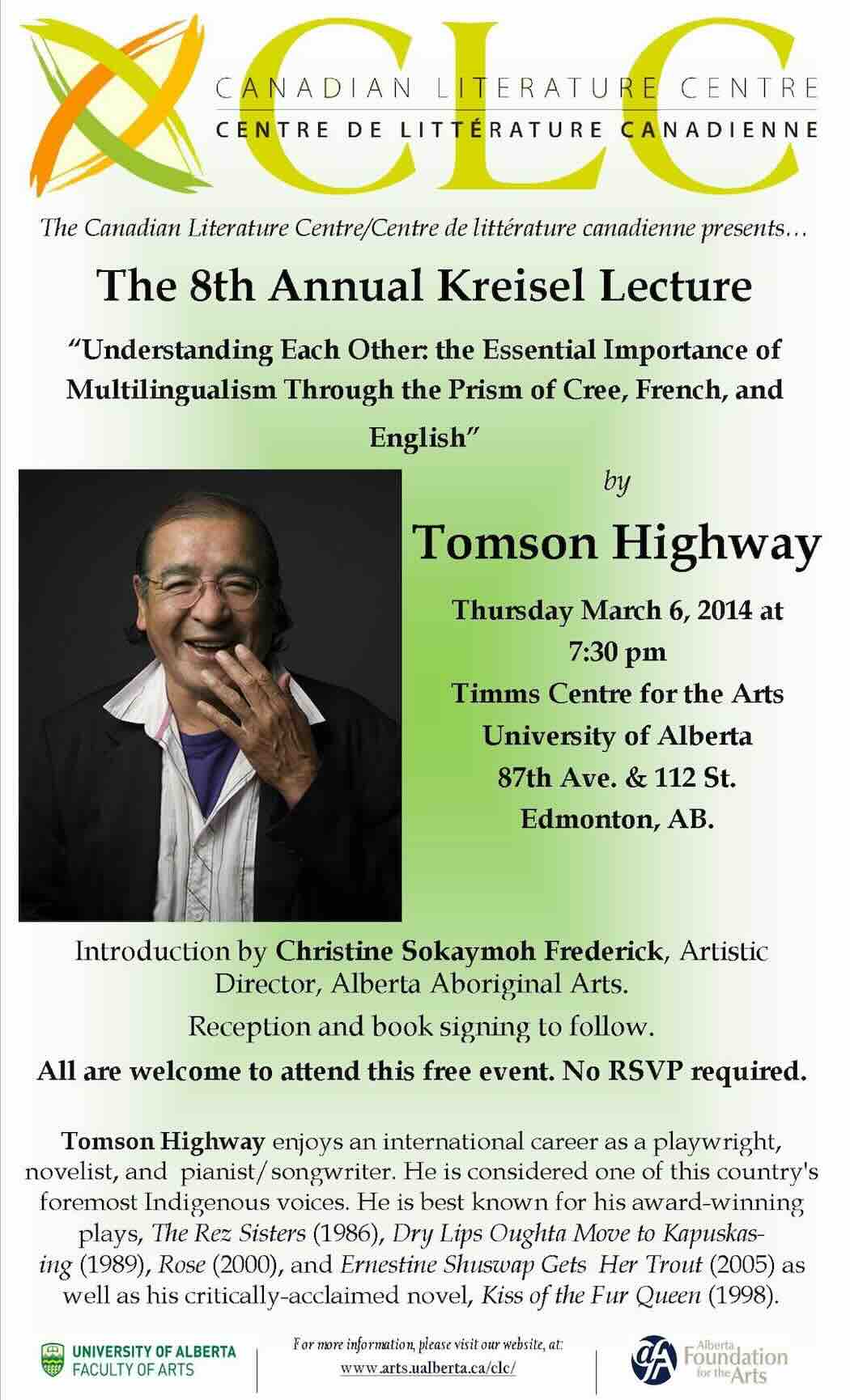
Portrait photo credit: Sean Howard
2013 Kreisel Lecture with Esi Edugyan
"Don't Turn Back: Observations on Home"
On Tuesday, April 16, 2013, Esi Edugyan presented the 7th annual Kreisel Lecture, which she titled "Don't Turn Back: Observations on Home." Author Marina Endicott introduced Edugyan, whose lecture was followed by a Q & A, reception, and book signing at the TIMMS CENTRE for the ARTS.
Lecture Abstract:
Home is the first exile. We dream of being elsewhere, and this is one of the ways we find out where we are. Home can be a place, it can be an idea, it can be a person or a memory or a dream. I want to talk a little bit about what home has meant to me, how it can change in one’s absence, how the passing of time affects home just as it affects us, and how such change can alter something in us, too. We are fortunate to live in a nation in which where we have been is allowed to be an essential part of where we are: our pasts can be a part of our present. In my lecture I will talk about home as here, home as over there, and home as nowhere. But at the heart of my talk is the firm belief that telling stories about other places, other lives, other experiences, is one of the ways we struggle to understand who we are. Every farewell carries the promise of a return.
My first novel, The Second Life of Samuel Tyne, explores the afterlife of a town in Alberta founded by freed black slaves who traveled north. My second novel, Half-Blood Blues, tells the story of American and European musicians fleeing the violence in Europe on the eve of the Second World War. Both novels are troubled by the idea of rootedness, by the relationship of belonging to place. And I have come to suspect both novels reflect a wider concern in our ever-shrinking world: how do we find belonging, how do we choose it, is it even up to us?
This lecture was published with the title Dreaming of Elsewhere: Observations on Home.
Author biography that was included in the event program:
Esi Edugyan’s most recent novel, Half Blood Blues, won the 2011 Scotiabank Giller Prize and the 2012 Ethel Wilson Fiction Prize. It also won the 2012 Anisfield-Wolf Book Award, which recognizes books that have made important contributions to our understanding of racism and our appreciation of the rich diversity of human cultures. The novel was a finalist for the 2011 Man Booker Prize, the 2012 Orange Prize, the 2011 Governor General’s Literary Award for Fiction, and the 2011 Rogers Writers’ Trust Fiction Prize. Her debut novel, The Second Life of Samuel Tyne, was published internationally to critical acclaim. Her work has appeared in several anthologies, including Best New American Voices 2003. Edugyan has held fellowships in the U.S., Scotland, Iceland, Germany, Hungary, Finland, Spain and Belgium. She lives in Victoria, British Columbia, with her husband and daughter.
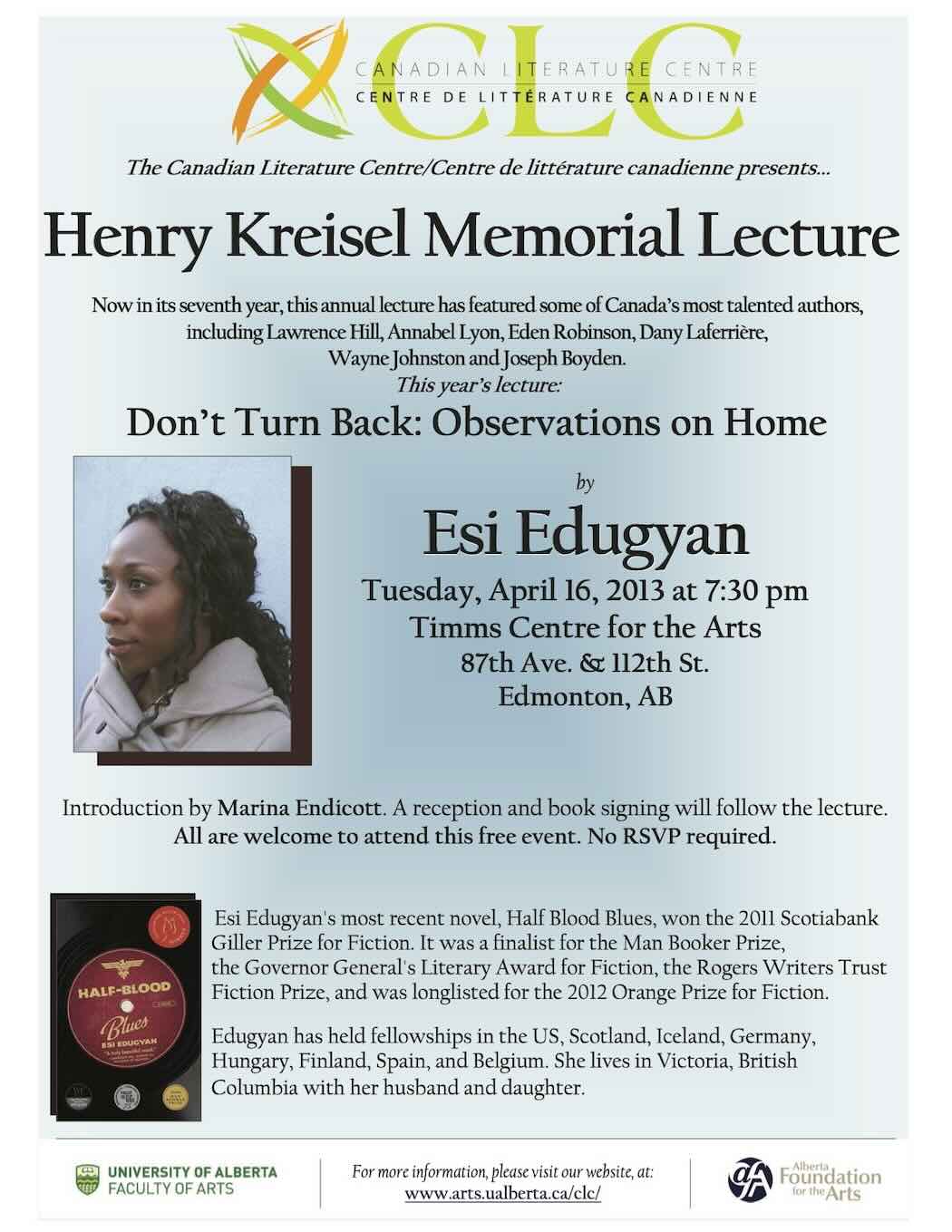
2012 Kreisel Lecture with Lawrence Hill
"Dear Sir, I Intend to Burn Your Book"
The 6th annual Kreisel Lecture was presented by Lawrence Hill on Tuesday, April 17, 2012. Hill was introduced by Dr. Ted Bishop before giving his lecture, titled "Dear Sir, I Intend to Burn Your Book," which was followed by a Q & A, reception, and book signing at the TIMMS CENTRE for the ARTS.
Watch the lecture on YouTube.
The lecture was published with the title Dear Sir, I Intend to Burn Your Book: An Anatomy of a Book Burning.
Author biography that was included in event promotions:
An award-winning Canadian novelist and memoirist, Lawrence Hill is the son of American immigrants—a black father and a white mother—who came to Canada the day after they married in 1953 in Washington, D.C. Hill was greatly influenced by his parents’ work in the human rights movement, and much of his writing touches on issues of identity and belonging.
Formerly a reporter with The Globe and Mail and parliamentary correspondent for The Winnipeg Free Press, Hill is the author of three novels, including Some Great Thing (HarperCollins Canada, 1992), Any Known Blood (HarperCollins Canada, 1997), and The Book of Negroes (HarperCollins Canada, 2007), which was longlisted for the Giller Prize and won the 2007 Rogers Writers’ Trust Fiction Prize, the 2008 Commonwealth Writers’ Prize, the 2008 Evergreen Award (presented by the Ontario Library Association), and the 2009 edition of Canada Reads. The Book of Negroes was published in the U.S. under the title Someone Knows My Name. Hill has also written numerous essays and non-fiction works, and received a 2005 National Magazine Award for best essay for “Is Africa’s Pain Black America’s Burden?”, published in The Walrus. He also penned the screenplay for Seeking Salvation, a documentary film about the Black church in Canada, which won the American Wilbur Award for best national television documentary in 2005.
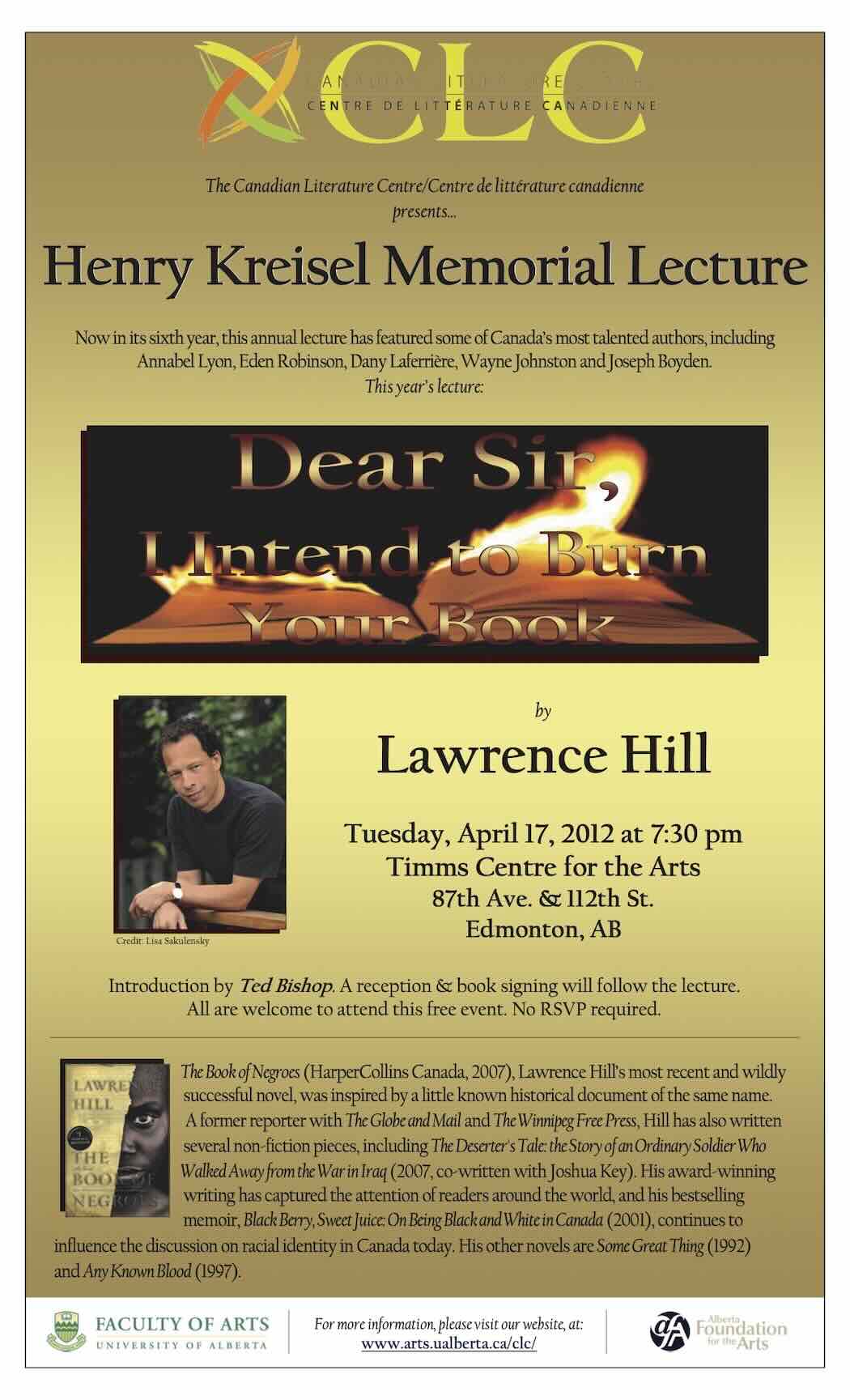 Portrait photo credit: Lisa Sakulensky
Portrait photo credit: Lisa Sakulensky
2011 Kreisel Lecture with Annabel Lyon
"Imagining Ancient Women"
On Monday, March 14, 2011, Annabel Lyon presented the 5th annual Kreisel Lecture, titled "Imagining Ancient Women," at the TIMMS CENTRE for the ARTS. Curtis Gillespie, award-winning author, journalist, and editor of Eighteen Bridges magazine, gave opening remarks and the lecture was followed by a Q & A, reception, and book signing.
Listen to the lecture on YouTube.
This lecture was published with the title Imagining Ancient Women.
Author biography that was included in event promotions:
Annabel Lyon is a Vancouver fiction writer and teacher. Her first books are a short story collection titled Oxygen (2000), and The Best Thing for You (2004), which contains three novellas and was nominated for the Ethel Wilson Fiction Prize. The Golden Mean (2009), her first novel and third work of fiction, holds the distinction of being the only book nominated that year for all three of Canada’s major fiction prizes: the Scotiabank Giller Prize, the Governor General’s Award for English language fiction and the Rogers Writers’ Trust Fiction Prize, the last of which it won. The Golden Mean was also nominated for the Commonwealth Writers’ Prize, and is being published in six languages. Given its provocative book cover, it was banned from BC Ferries in 2010, has earned international critical acclaim, and has become a Canadian bestseller. It was recently named the Grant MacEwan University Book of the Year.
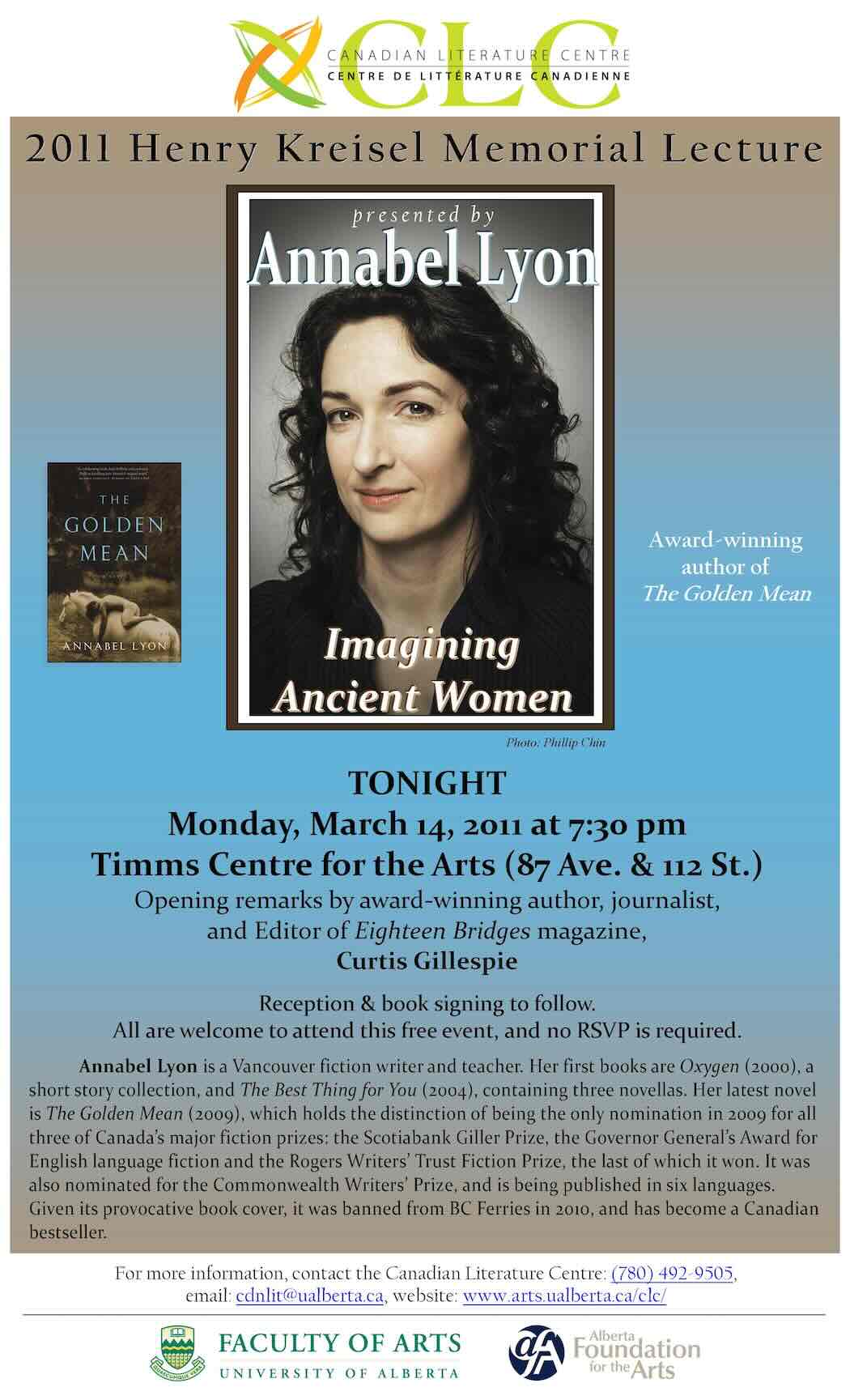
Portrait photo credit: Phillip Chin
2010 Kreisel Lecture with Eden Robinson
"The Sasquatch at Home: Traditional Protocols & Modern Storytelling"
On Tuesday, March 2, 2010, Eden Robinson presented the 4th annual Kreisel Lecture, titled "The Sasquatch at Home: Traditional Protocols & Modern Storytelling," at the TIMMS CENTRE for the ARTS. Edmonton journalist Paula Simons gave opening remarks, and the lecture was followed by a Q & A, reception, and book signing.
Listen to the lecture on SoundCloud.
This lecture was published with the title The Sasquatch at Home: Traditional Protocols & Modern Storytelling.
Author biography that was included in event promotions:
Eden Robinson is the internationally acclaimed author of Traplines, Monkey Beach, and Blood Sports. Traplines was the winner of the New York Times Notable Book of the Year and Britain’s Winfred Holtby Memorial Prize. Monkey Beach was nominated for the Giller Prize, the 2000 Governor General’s Award for Fiction, and was selected as the Globe and Mail’s Editor’s Choice. Robinson is a member of the Haisla and Heiltsuk First Nations.
“I was born on the same day as Edgar Allan Poe and Dolly Parton: January 19. I am absolutely certain that this affects my writing in some way.” – Eden Robinson
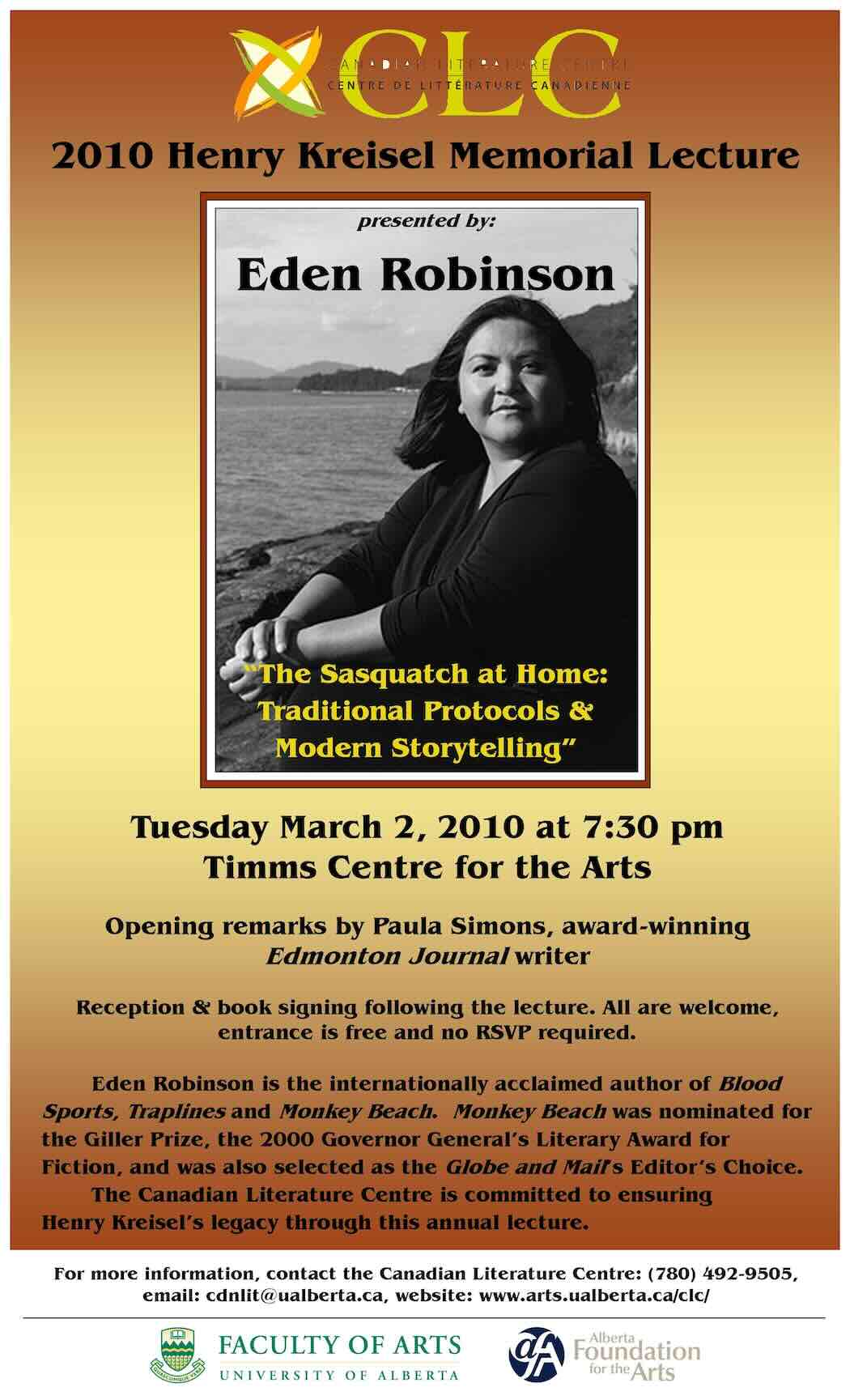
Portrait photo credit: Arthur Renwick
2009 Kreisel Lecture with Dany Laferrière
« J'écris comme je vis » / "I Write as I Live"
Dany Laferrière was the invited speaker for the 3rd annual Kreisel Lecture, held on Thursday, March 5, 2009, at the TIMMS CENTRE for the ARTS. The lecture, titled « J'écris comme je vis," was the first Kreisel Lecture and Q & A presented in French.
Écoutez la conférence sur YouTube.
This lecture was published with the title Un art de vivre par temps de catastrophe.
Author biography that was included in event promotions:
Unconventional, controversial, prolific and immensely talented, Dany Laferrière was born in Haïti and adopted Montréal, Miami, and New York as his new homes. He is self-avowedly North American, and a universal writer. Also a journalist, TV and radio host, screenwriter and film director, Laferrière achieved critical fame with his first novel, How to Make Love to a Negro Without Getting Tired, and sparked controversy in the United States with the film version of this book. With humour and clarity and a literary style all his own, Laferrière's work examines Haïtien, Québécois and North American society and interracial relationships. His book Je suis fou de Vava won the Governor General's Literary Award for Children's Literature in 2006.

Portrait photo credit: Eléanor Le Gresley
2008 Kreisel Lecture with Wayne Johnston
"The Old Lost Land of Newfoundland: Memory, Family, Fiction, and Myth"
Wayne Johnston presented the 2nd annual Kreisel Lecture, titled "The Old Lost Land of Newfoundland: Memory, Family, Fiction and Myth," on Wednesday, March 5, 2008. The Canadian Literature Centre hosted the lecture, which was followed by a reception and book signing, at the TIMMS CENTRE for the ARTS.
This lecture was published with the title The Old Lost Land of Newfoundland: Family, Memory, Fiction, and Myth.
Author biography that was included in event promotions:
Wayne Johnston was born and raised in Goulds, Newfoundland. He obtained a BA in English from Memorial University and worked as a reporter for the St. John’s Daily News before deciding to devote himself full-time to creative writing. Since then, Johnston has written seven books and has been a contributing editor for The Walrus. His first book, The Story of Bobby O’Malley, won the WH Smith/Books in Canada First Novel Award. Baltimore’s Mansion, a memoir dealing with his grandfather, his father, and himself, was tremendously well-received and won the prestigious Charles Taylor Prize for Literary Non-Fiction. His novels The Colony of Unrequited Dreams and The Navigator of New York spent extended periods of time on bestseller lists in Canada and have been published in the US, Britain, Germany, Holland, China, and Spain. Colony was also identified by The Globe and Mail as one of the 100 most important Canadian books ever produced. Johnston divides his time between Toronto and Roanoke, Virginia, where he has held the Distinguished Chair in Creative Writing at Hollins University since 2004.
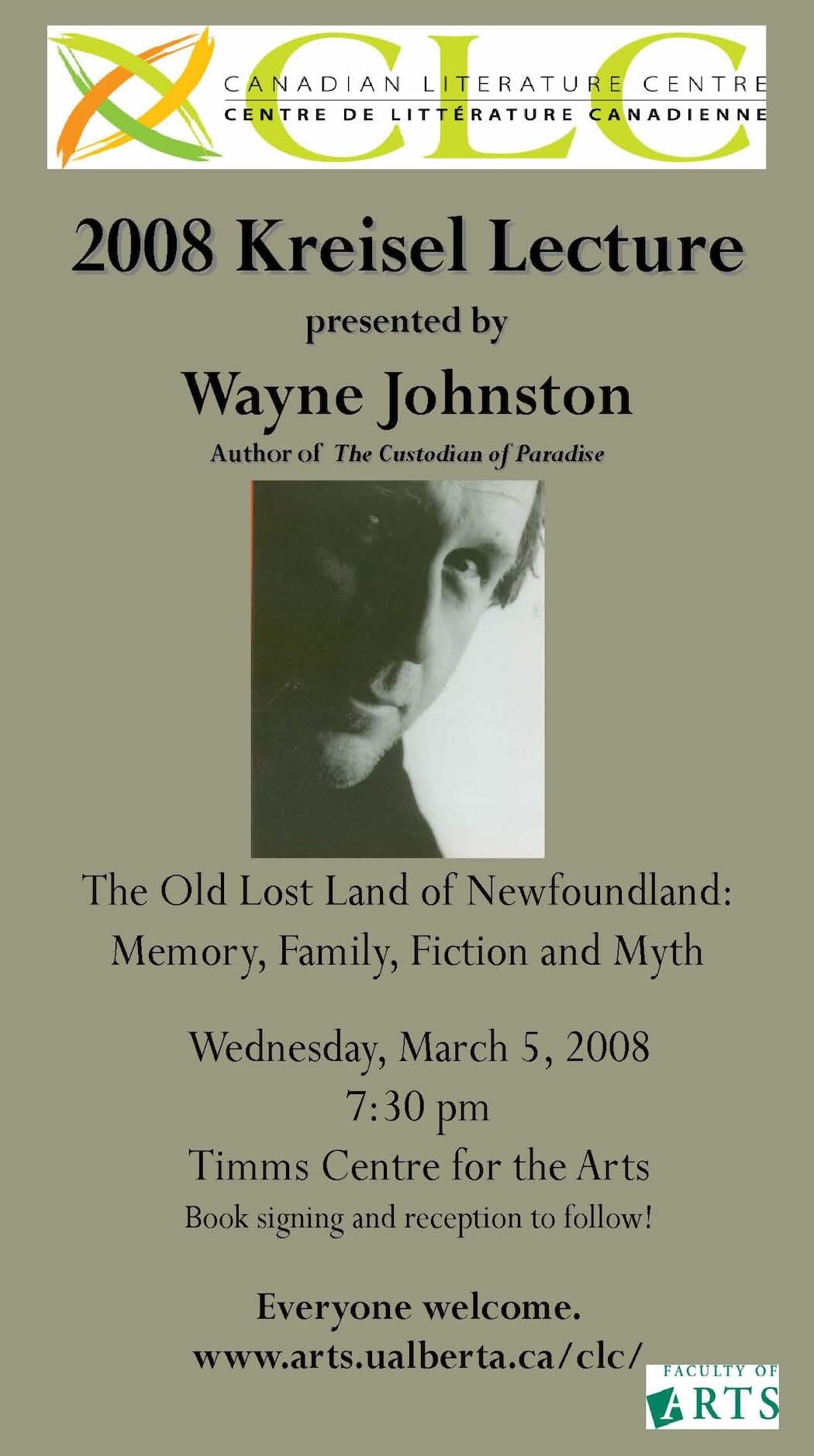
2007 Kreisel Lecture with Joseph Boyden
"Mushkegowuk to New Orleans: A Mixed Blood Highway"
On Wednesday, March 21, 2007, Joseph Boyden, author of Three Day Road, presented the inaugural Henry Kreisel Memorial Lecture, hosted by the Canadian Literature Centre and co-sponsored by the Faculty of Arts. This free admission lecture, titled "Mushkegowuk to New Orleans: A Mixed Blood Highway," was open to the public and held in Convocation Hall in the Arts building at the University of Alberta. It was followed by a reception and book signing.
Lecture Abstract:
Joseph Boyden's lecture will explore the similarities and differences between Northern Ontario and Louisiana, including the social ills of these two different places and the similar social fabric of two cultures–New Orleans African American and Native Canadian.
This lecture was published with the title From Mushkegowuk to New Orleans: A Mixed Blood Highway.
